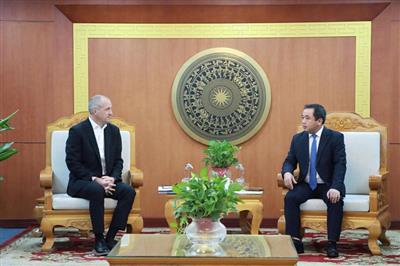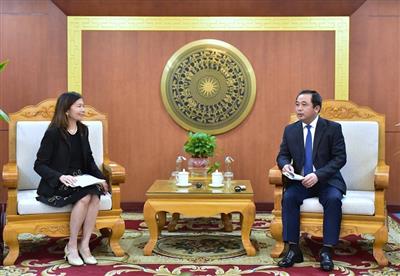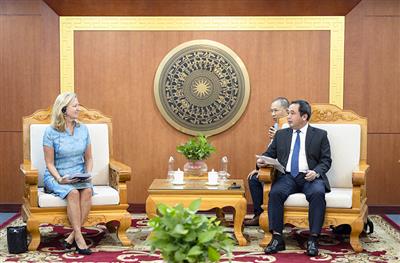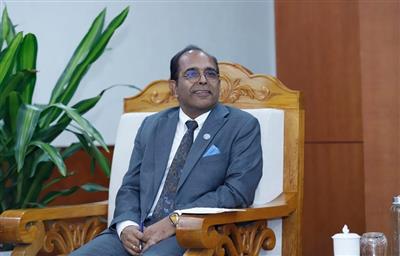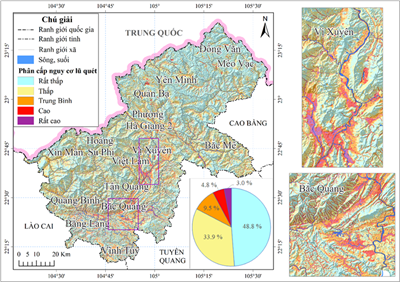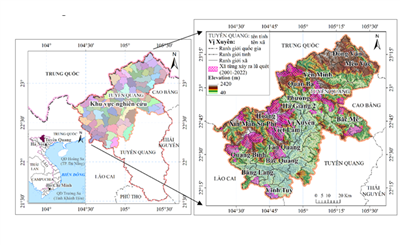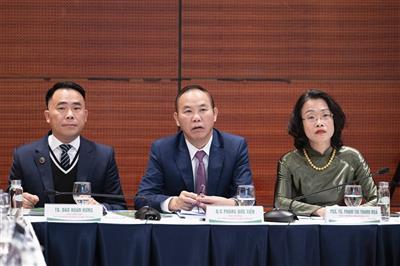
Shaping Vietnam’s agricultural digital future: Multi-stakeholder perspectives
18/09/2025TN&MTDigital transformation has been identified as one of the eight top priorities of the National Digital Transformation Program to 2025, with a vision to 2030, opening opportunities to restructure the agricultural sector toward value-added, sustainable growth, and deeper integration into the digital economy. At the Forum on “Digital transformation and innovation in agricultural development and environmental protection”, organized by the Trade Promotion Centre for Agriculture (under the Ministry of Agriculture and Environment) on September 18, in Hanoi, policymakers, experts, and businesses presented a range of substantive perspectives and proposals. These viewpoints sketched a comprehensive picture of the requirements, conditions, and pathways for advancing agricultural digital transformation in line with the objectives of green development and ecological sustainability.
Driving agricultural digital transformation: The need for integrated data, digital skills, and investment capital
Mr. Pham Duy Khanh, Director of the Rural Development Centre (Institute of Strategy and Policy on Agriculture and Environment, Ministry of Agriculture and Environment)

To make digital transformation a true breakthrough driver for agriculture, Mr. Pham Duy Khanh proposed a package of integrated solutions aimed at fostering green, sustainable, and environmentally friendly growth. According to him, the foremost task is to build a digital data system for the agricultural sector, supported by an integrated monitoring and surveillance network from aerial to ground levels. A comprehensive data
repository on climate, soil, weather, environment, and cultivation zoning codes will provide a foundation for timely policymaking while enabling farmers and enterprises to forecast production, mitigate risks, and optimize investment.
Reflecting on current realities, Mr. Pham Duy Khanh candidly observed: “At present, technology developers do not fully understand agriculture, while those in agriculture often lack knowledge of technology. This disconnect has caused many digital solutions to fail in practice, as they do not match production needs.” He emphasized the need to build cross-disciplinary teams of technology experts who also understand the characteristics, needs, and cultivation practices of specific crops, farming systems, and varieties. Only then can digital technologies be applied effectively, ensuring that solutions are not only advanced but also practical and relevant to farmers’ realities.
Another pressing task is to enhance digital literacy and awareness among farmers, businesses, and cooperatives. Training should take diverse forms—on-site, online, and experiential models, helping farmers grasp the benefits, operations, and risks of adopting new technologies. Once farmers can master technology, digital transformation can take root and spread sustainably.
At the same time, investment is needed to develop rural digital infrastructure and a comprehensive agricultural digital ecosystem. High-speed internet, cybersecurity, e-commerce platforms, digital payment systems, and transparent land management platforms will provide the enabling environment for digital agricultural innovations to emerge, connect, and scale up.
Finally, financial and credit support policies must be strengthened to encourage enterprises, cooperatives, and farmers to invest in digital technologies. Priority access to loans and credit for digitalization projects in production, processing, and distribution will provide a crucial boost, aligning agricultural digital transformation with green growth and emission reduction targets.
Applying advanced technologies in managing and developing agricultural value chains
Mr. Nguyen Kim Phuc, Deputy Director General of the Digital Transformation Department (Ministry of Agriculture and Environment)
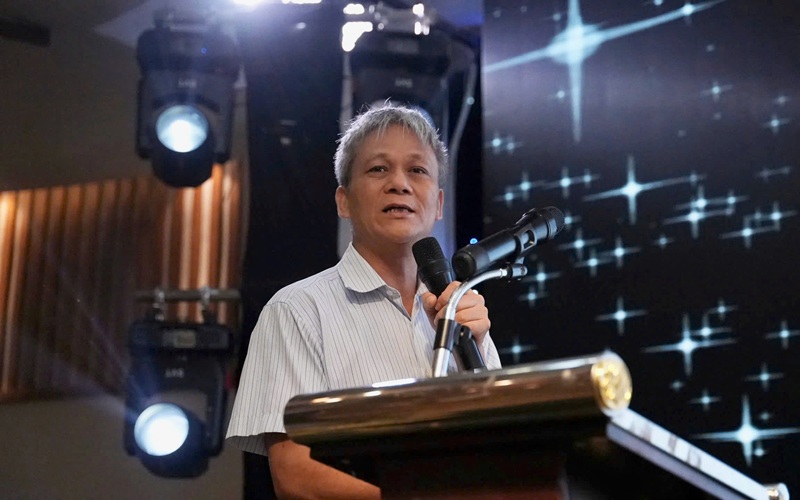
Mr. Nguyen Kim Phuc stressed that raising digital literacy and capacity among the agricultural workforce is a foundational solution, since people are the direct agents of technology adoption. He called for stronger communication campaigns to promote the benefits of digital transformation to farmers and enterprises, while expanding training
programs and technical workshops to equip farmers and cooperative staff with digital skills. Digital technologies should also be integrated into agricultural extension services and vocational training curricula in rural areas.
Pilot models applying IoT and AI directly in the fields will allow farmers to “see and hear” the effectiveness of technology, thereby cultivating a generation of “young digital farmers” who can operate modern machinery and software. In parallel, a corps of “digital agricultural extension officers”, rural technology experts supporting farmers in their digital journey, should be developed.
Mr. Nguyen Kim Phuc underscored the urgency of investing in comprehensive digital infrastructure for rural areas. The State must allocate adequate resources, combined with socialized investment, to upgrade telecom and IT infrastructure. The goal is that by 2030, every village will have broadband internet and stable 4G/5G coverage, with a high proportion of smartphone users. At the same time, national and regional agricultural data centers should be established to provide safe data storage and processing. Local governments should also support the creation of community technology service points where farmers can access equipment, test applications, and receive technical assistance.
In building an open, interoperable agricultural data ecosystem, the Ministry of Agriculture and Environment should play the role of “conductor” by establishing common data standards and integrating land, climate, crop, livestock, and market price data into shared repositories. Developing an open agricultural data portal, with controlled access to non-sensitive datasets, along with APIs connecting enterprise software to government systems, will be essential. By 2030, Vietnam should aim to establish a continuously updated national digital agriculture map with predictive capabilities, providing the foundation for AI and Big Data to maximize their effectiveness, supporting accurate decision-making for farmers and enterprises alike.
Policy and financial mechanisms are also critical enablers. The government should introduce preferential credit policies for high-tech agricultural projects, low-interest loan packages to help farmers purchase IoT devices and drones, and expanded credit guarantees for agri-tech startups. Establishing venture funds for agricultural innovation, while ensuring the legal recognition of digital data, e-contracts, and electronic traceability in agricultural transactions, will provide a strong institutional backbone. Agricultural extension programs should shift their focus from traditional material support to technology, training, and digital advisory services.
Equally important is fostering public–private partnerships and nurturing a digital agricultural startup ecosystem. The State should create a supportive legal environment, while technology firms and agricultural businesses act as key implementers. Digital supply chain management platforms, agri-logistics services, online trading exchanges, and traceability tools must be supported, alongside incubators and innovation hubs for Agriculture 4.0 in key production zones. National contests seeking promising digital agriculture initiatives should also be organized.
Ultimately, effective coordination and synchronized implementation will be decisive. The Ministry of Agriculture and Environment should serve as the focal point, coordinating ministries, sectors, and localities under a clear roadmap tied to agricultural digital transformation indicators. From 2024–2025, the priority should be digitalizing data and processes; beyond 2025, the focus should shift to automation and AI in high-potential areas such as smart crop production, intensive livestock farming, export-oriented aquaculture, and sustainable forestry. Well-orchestrated coordination among stakeholders is expected to generate breakthroughs, making digital transformation a key driver of green, sustainable agricultural development.
Building and developing a digital trade promotion ecosystem
Mr. Nguyen Minh Tien, Director of the Trade Promotion Centre for Agriculture, Ministry of Agriculture & Environment

Reflecting on current practices in trade promotion for agriculture and environment, Mr. Nguyen Minh Tien argued that pressing and highly specific requirements now call for digital transformation and innovation. The needs of agricultural enterprises today go far beyond “having venues and fairs”; what is required is a multidimensional digital ecosystem where trade promotion, communication, distribution and logistics, traceability, and quality management are seamlessly integrated.
In this context, if Vietnam does not soon build a specialized digital trade promotion platform for agriculture and environment, the risk of falling behind is evident. Especially amid deep international integration, where technical standards, non-tariff requirements, traceability, quarantine, and environmental certifications increasingly serve as critical market passports, a fragmented, non-digitalized trade promotion system will no longer suffice.
At the forum, Mr. Nguyen Minh Tien proposed solutions for developing a digital trade promotion ecosystem. He emphasized that building a comprehensive digital trade promotion system requires simultaneously strengthening multi-sectoral linkages within the country, expanding international cooperation, and vigorously applying new technologies such as AI, Big Data, and Blockchain. These are strategic levers to mobilize resources, share knowledge, and enhance the competitiveness of Vietnamese agricultural products in global markets.
According to him, establishing effective coordination networks among ministries, sectors, and localities is key to ensuring policy coherence and resource allocation, making it easier for enterprises and cooperatives to access the digital trade promotion ecosystem. Public–private partnerships should also be expanded to involve technology firms, e-commerce platforms, and logistics providers in building and operating digital trade promotion systems for agriculture.
Internationally, Vietnam should deepen cooperation with countries that have advanced digital trade systems to learn from their experiences, acquire modern technologies, and actively participate in global forums and initiatives on digital trade and sustainable agriculture. This will not only open new market opportunities but also raise the profile of Vietnamese agricultural products.
At the same time, applying advanced technologies like AI, Big Data, and Blockchain can deliver transformative improvements in trade promotion. AI can analyze massive datasets to forecast consumer trends, personalize customer experiences, optimize marketing campaigns, and even provide 24/7 customer support through chatbots and virtual assistants. Big Data can help businesses closely track supply-demand fluctuations, optimize logistics, and support strategic decision-making with visualized reports and analytics.
Meanwhile, Blockchain should be piloted for cross-border traceability to meet strict market requirements in the EU and United States. AI can also be tested for image-based agricultural product grading, while “mobile digital marketplaces” linked to e-commerce platforms such as Shopee and TikTok Shop can expand distribution channels. These steps promise to align Vietnam’s agricultural trade promotion ecosystem with global trends in digitalization and integration.
To realize the goal of agricultural digital transformation, collective commitment across the system is indispensable, from the political will of central government, to the proactive engagement of local authorities, the innovative efforts of technology enterprises, and the active participation of each farmer. The immediate priority is to improve institutions and policies, invest in comprehensive digital infrastructure, build an open agricultural data ecosystem, and strengthen digital skills across all stakeholders.
When technology becomes familiar and accessible, it will no longer be perceived as remote but instead serve as a foundation for a new model of agricultural growth, more transparent, efficient, and sustainable. With sound direction and strong determination, there is every reason to believe that Vietnam’s agriculture will achieve a successful “digital transition,” affirming its role as a pillar of the national economy in the new era.
Khanh Linh - Ngoc Huyen




